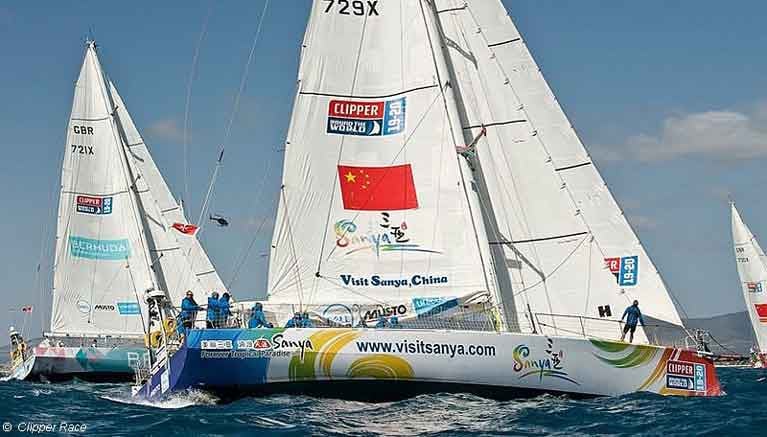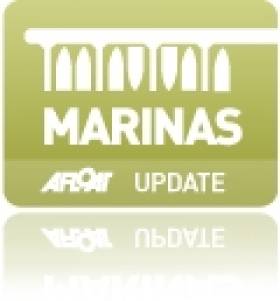Displaying items by tag: Clipper Round the World
Dublin Bay Sailor David FitzPatrick Joins Clipper Round the World Race for Demanding Stage South of Australia
Round the World Clipper Race contender Visit Sanya China will be in catch-up mode when she starts the Australian coastal stage (leg 4) on Christmas Day from Fremantle on the west coast to the Whitsundays on the northeast Great Barrier Reef coastline. Together with two other boats – Punta del Este and UNICEF – Sanya is starting with a three-day gap on the rest of the 11-boat fleet, having been delayed by a collision in Capetown with Punta del Este at the start of the leg to Australia.
Dublin Bay Sigma 33 sailor and noted offshore contender David FitzPatrick is joining Sanya for the first time for this leg, and he will also be aboard for the final stage. As the race to the Whitsundays will be based on elapsed time from actual starting time, Sanya is back in the hunt on a particularly challenging stage which takes the fleet into the Southern Ocean.
Miss Universe UK To Contest Clipper Yacht Race
Miss Universe UK winner and former I’m a Celebrity Get Me Out of Here contestant Amy Willerton will take on one of her toughest endurance challenges yet, when she sails 3,350 nautical miles across the Atlantic Ocean next June and July, in the final leg of the world’s longest ocean race and endurance challenge, the Clipper 2015-16 Round the World Yacht Race.
Like 40 per cent of Clipper Race crew, Amy had no previous sailing experience before completing an intensive four week sail training course at the race’s Sydney, Australia base in preparation. She said: “I love taking on a challenge and trying something new and the Clipper Race is the Everest of the ocean. This is probably the hardest thing I’ve done, both physically and mentally and there is so much to learn and to be aware of. But of course that’s what makes it more exciting.”
“I don’t think most people would associate me with challenges like this, as they just see a girly-girl in front of a camera, however I’m a real tomboy at heart and I can’t wait to get stuck into this challenge.”
The Clipper Round the World Yacht Race is a 40,000 mile ocean odyssey across six continents which takes eleven months to complete. The only event of its kind which trains amateurs to become ocean racers, it consists of twelve teams racing each other through some of Mother Nature’s harshest conditions.
Legendary sailor Sir Robin Knox-Johnston, 76, was the first man to sail around the world, solo, non-stop in 1968/69. He established the Clipper Race in order to allow non-sailors the opportunity to experience the thrill of ocean racing.
After meeting Amy at the Clipper Race’s training HQ, Sir Robin commented: “It is great that Amy has decided to go beyond her comfort zone and join the Clipper Race. Around a third of our crew are female and perform just as well as their male crewmates. Amy really impressed our training team in Australia and I have no doubt she will put everything into the experience and be a worthy crew member.
“Sailing across the Atlantic Ocean is no easy feat. There could be rough weather and big challenges to overcome, and it takes a huge amount of dedication and team work. Amy is joining the final leg of this highly competitive 11-month race and there will still be much to race for as the teams head for home. I wish Amy all the best of luck.”
The only professional on board each yacht is the Skipper, however whilst the crew may be amateur, Mother Nature allows no handicap as storms, strong winds and big waves challenge the crew and make for testing sailing and living conditions. In complete contrast to her glamorous LA lifestyle, Amy will sleep in a small bunk and share a confined 70 foot living space with up to 23 other crew mates.
Amy will be in a watch system which works in four hour shift patterns to allow the boat to keep racing 24/7, she will also join the rest of the crew in taking turns to cook and clean for the entire team, all while the boat can be heeling over at a forty-five degree angle.
Amy, no stranger to endurance challenges, having completed the London Marathon and various triathlons, will join the Garmin team in June 2016 when the Clipper Race sets sail from New York for its homecoming leg which will take approximately two months to complete.
Including stopovers in Derry-Londonderry, Northern Ireland and Den Helder, the Netherlands, Amy and the rest of the Clipper Race crew’s adventure will conclude in London on 30 July 2016 with a spectacular Thames River parade.
Amy added: “Being on the Clipper Race is a huge responsibility and it's made me grow up a lot. The team skills I was lacking when I did I’m a Celebrity Get Me Out of Here have been realised since learning to sail. The danger is very real and making mistakes or being lazy can be catastrophic!
“You are so close to nature and really you are in the hands of the sea - it's a beautiful thing when you learn to recognise how to bend the wind to your will and watch the sunrise and sunsets on the water. The storms provide the adrenaline I love, such as when you are facing a wave as big as a house and all you can do is keep going!”
Explaining why she chose the final leg of the race, Amy said: “I am now based in the US and work a lot in New York so sailing home to London means a lot to me. I’ve made the trip many times by air but never in my wildest imagination would I have thought I would ever sail all that way.”
Fanfare in Derry as New Marina Officially Opened
#IRISH MARINAS - Five months after hosting the Clipper Round the World yacht race this summer, the new marina at Derry-Londonderry has been officially opened to much fanfare.
The Belfast Telegraph reports on the weekend's celebrations, which welcomed the return of the city's entry in the world-renowned yacht race.
Derry-Londonderry's challenge will soon be featured in the Discovery Channel TV documentary series Against the Tide, according to the Derry Journal.
Speaking at the launch event, Foyle Port CEO Brian McGrath hailed its "state-of-the-art facilities for hosting maritime events".
The new marina is a joint initiative by the Loughs Agency and Cruise Initiative and is maintained by Foyle Port.
Young Guns and a New Clipper Competition
In this week's podcast, you could win one of two spaces on one of the Clipper Yachts for the sail from Kinsale to Cork this Wednesday. Plus we talk to the young guns from Schull Community College and the Pride of Wicklow about their victories in recent days.
































































